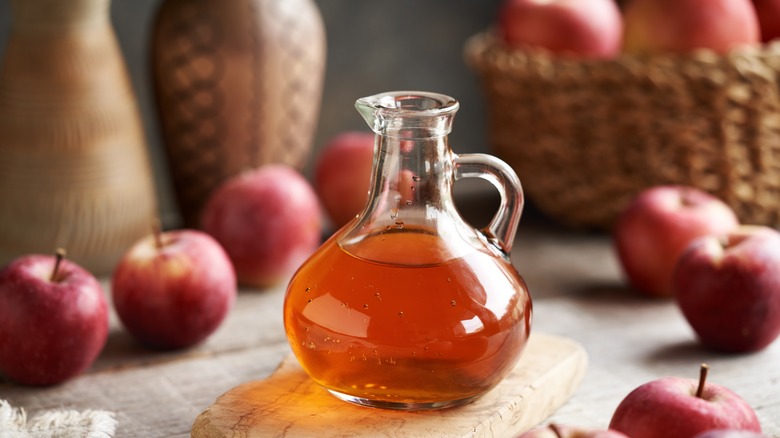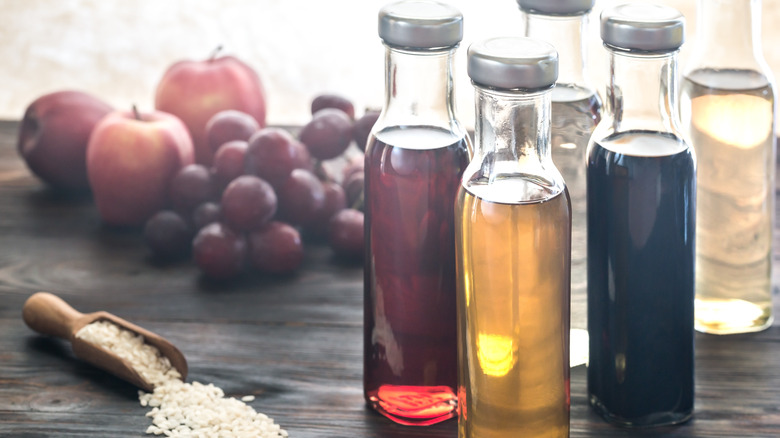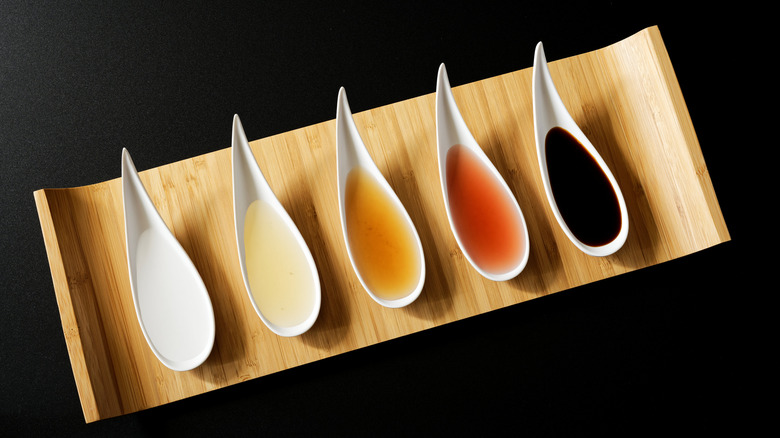The Best Substitutes For Apple Cider Vinegar
We may receive a commission on purchases made from links.
Apple cider vinegar has become something of a must-have in everyone's kitchen. Apart from any alleged dietary benefits, it's an easy fix for overly sweet fruit juice, it can be used to clean an electric kettle, and it even makes for a tasty cocktail ingredient. It's also particularly useful as an ingredient in cooking and baking, since it boasts a complex flavor and a sweet-tart apple character that works particularly well as a glaze for pork chops or a tangy upgrade to apple pies.
But what happens when you're in the middle of meal prep and you suddenly realize you're out of apple cider vinegar? Spend enough time in the kitchen and swapping one ingredient for another becomes muscle memory, like knowing what to use and not use in place of sour cream. So, which vinegar in your pantry is the best option in apple cider's stead? It turns out white rice wine vinegar, popular in East Asian cooking, is the closest, thanks to its slightly sweet, complex flavor notes. Be sure and grab rice wine vinegar and not just rice wine: The two are different.
Substituting rice wine vinegar
In general, many light-colored vinegars work as a straight-across 1:1 replacement for apple cider vinegar. This is useful in baking, since vinegar works for not only flavoring dishes, but can serve as a leavening and stabilizing agent, and helps create moist, soft cakes. With sauces, stews, and salad dressings, you're more concerned about the flavor profile and levels of acetic acid than precise measures. Apple cider has a relatively low acetic acid content between 4% and 5%.
The best substitute is one that mimics the sweet and sour balance while adding a hint of umami. Rice vinegar, like Marukan genuine brewed rice wine vinegar, works particularly well. In fact, since apple cider vinegar stands in well for rice vinegar, the reverse stands to reason. But why?
Side by side, apple cider vinegar is darker and cloudier, where rice wine is the same white to pale yellow as regular white wine vinegar. But smelling and tasting them reveals similarities. Apple cider vinegar is rich and fragrant, and has a definite apple note when sipped. Rice wine vinegar is a bit more subtle aromatically, with a slight bread or wood note. Sipping it, it's actually a little sweeter than apple cider vinegar, but with a slight pleasing umami finish of earth and wood. Used as ingredients in many dishes, the taste is nearly indistinguishable. Also, rice wine vinegar may have the same or slightly higher acid content, depending on the brand and style.
Other substitutes for apple cider vinegar
If you don't happen to have any rice vinegar handy, don't worry — there are other substitutes for apple cider vinegar that can work in a pinch. While regular white wine vinegar is a little bland compared with apple cider vinegar, it's an effective substitute and won't adversely affect the flavor of the finished product. It does have a slightly higher acid content of 6-7%. If you only have red wine vinegar on hand, that works, too. While the color is darker, the flavor is milder than apple cider vinegar. In baking, substitute it at a 1:1 ratio, but in other cooking, consider adding a bit more (maybe half as much more) red wine vinegar. Don't worry if the color of the finished dish darkens a bit.
Another excellent alternative if you have it is lightly aged sherry vinegar (also delicious in a watermelon gazpacho salad). It's almost the same color as apple cider vinegar and offers a similar sweetness, which balances its higher acid content (about 8%). With the boosted acidity, you may want to cut back how much sherry vinegar you use when swapping, perhaps by a quarter or so. In general, what you want to avoid swapping for apple cider vinegar are highly flavored or reduced vinegars, like balsamic (which is a better substitute for red wine vinegar) or, say, truffle-infused vinegars.
One caveat is that while white rice vinegar is the most common expression for that grain, there are multiple styles of rice vinegar, often found in specialty stores. There, you'll discover red, brown, black, and white versions. As a substitute for apple cider vinegar, the white version is your best bet.


